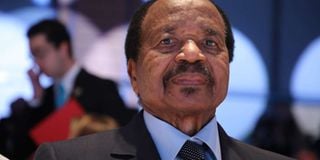President Biya's ruling party wins pioneer regional polls

Cameroon president Paul Biya.
What you need to know:
- The ruling party contested unopposed in about 34 of the 58 electoral constituencies.
- The council will have a say in development issues but cannot altar laws enacted by Parliament.
President Paul Biya’s ruling Cameroon People’s Democratic Movement (CPDM) party has won an overwhelming majority in the country’s first-ever election of regional councillors that was organised on Sunday, December 6, according to official results of the vote that was boycotted by the opposition.
The results, proclaimed Wednesday in accordance with Section 264(1) of the country’s electoral code, showed the ruling party won in nine of the country’s 10 administrative regions.
The 10th region was won by the presidential majority party, the National Union for Democracy and Progress (UNDP) of Tourism and Leisure Minister, Bello Bouba Maigari.
The crushing majority has come as no surprise, however, as the party contested unopposed in about 34 of the 58 electoral constituencies — including in the conflict-plagued English-speaking Northwest and Southwest.
Two opposition parties, the Social Democratic Front (SDF) of Ni John Fru Ndi and the Cameroon Renaissance Movement (MRC) of Prof Maurice Kamto, boycotted the elections.
A 24,241-man electoral college made of municipal councillors and traditional rulers took part in the vote to elect 900 pioneer regional councillors in the country, according to poll management agency, Elections Cameroon (ELECAM).
Armed separatists
The election in the Anglophone regions where government troops have for nearly four years now been battling armed separatists fighting to separate the English speakers from the majority French speaking country, was characterised by pockets of violence and the assassination of a municipal councillor.
The government, however, said that despite the assassination and calls for boycott “by political parties losing steam, the voter turnout everywhere was satisfactory,” Communications Minister and government spokesperson Emmanuel Rene Sadi said in a statement.
The Minister for Territorial Administration, government’s agent in the electoral process, had earlier said “no incident likely to cast doubt on the credibility of the polls or sincerity of the results from the ballot box, was recorded.”
Enshrined in the 1996 constitution of the country, the putting in place of the regional councils, according to the government, completes a process by President Paul Biya to decentralise power to local authorities.
The council will, however, have a say in development issues but cannot altar laws enacted by Parliament.





